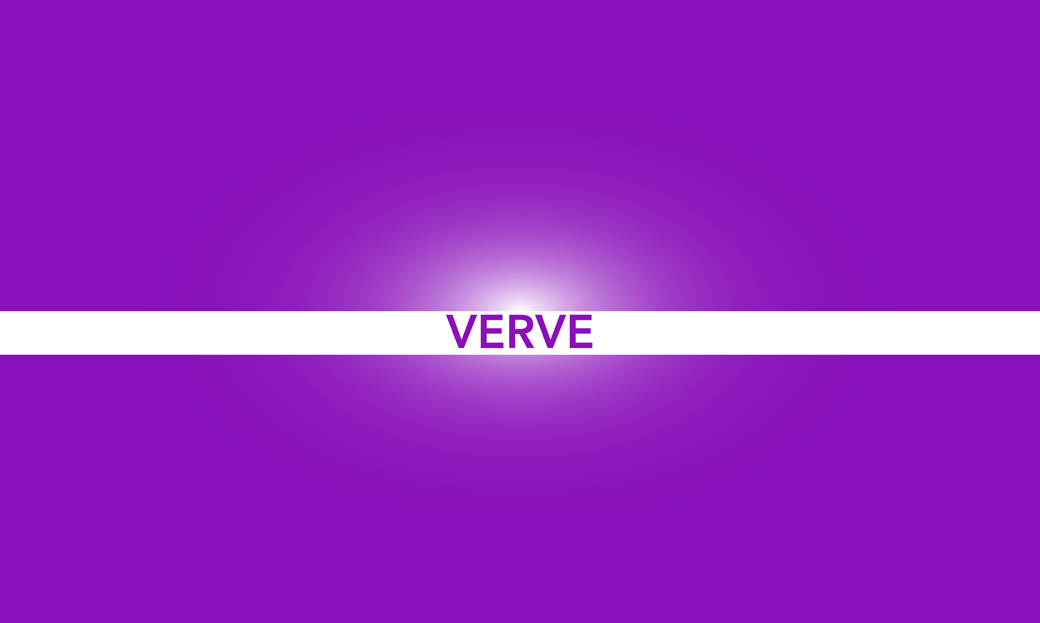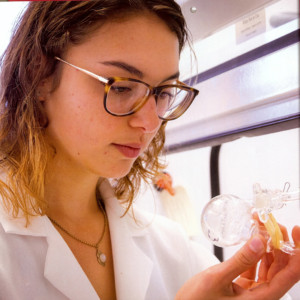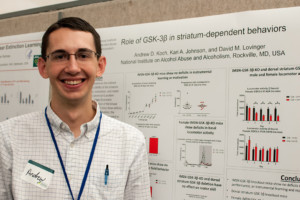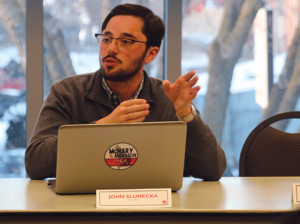
Three seniors share experiences in research, science
For students involved in research, USD offers many opportunities to get involved.
Three seniors, all who’ve been involved in research for years, shared their experiences in research, why they’re passionate about science and how USD helped them get where they are today.
Jade Fostvedt
Jade Fostvedt, a senior chemistry major, has being doing research since her freshman year. Since then, she has spent a summer at Stanford University through an REU program, was awarded a Goldwater scholarship and conducted research at the University of Montana through the National Student Exchange.
“I’ve done research in a lot of different locations, but it’s really probably my favorite here at USD just because of how small the department is,” she said. “It’s really collaborative and there’s lots of one-on-one time with the professors.”

Though Fostvedt has been part of multiple research projects, she’s been involved in one with chemistry professor James Hoefelmeyer regarding frustrated Lewis pairs since September of her sophomore year.
“It’s essentially a molecule that has an area of positive charge and an area of negative charge. And generally positive and negative charges come together to react, but in this case, they’re held apart from each other, hence the term ‘frustrated.’ And so smaller molecules can come in and get caught between these two centers and get ripped apart,” she said. “So we used it to break down harmful pollutants in the environment.”
This project is what Fostvedt focused on in her Goldwater application, and was also the basis of her Honors thesis, which she submitted last week.
“I proposed this research for the Goldwater and then I actually got to carry it out here at USD and then publish it in a scientific journal and use it as my thesis,” she said. “I don’t know if a lot of students get that opportunity, to not only do their thesis research, but have it be successful.”
The project on frustrated Lewis pairs is also the source of one of her favorite research experiences, Fostvedt said.
“We finally made this molecule, the frustrated Lewis pair that we had been trying so hard to make for like, a really long time,” she said.
buy clomid online https://www.parkviewortho.com/wp-content/languages/new/prescription/clomid.html no prescription
“And I was holding the flask in my hand, and (Hoefelmeyer) looked at me and he said, ‘You’re the only person in the entire universe to ever hold this molecule.’ And I thought that was the coolest thing.”
Fostvedt will be starting graduate school at University of California, Berkeley to get a Ph.D. in chemistry this July.
“I want to be a professor eventually, but I’ll have to do some post-doctoral research first. So maybe do that in Europe or maybe at a national lab here,” she said of her future career plans.
One thing Fostvedt wants to emphasize when she’s a professor is the importance of outreach — something she’s learned during her time at USD.
“I think that’s really powerful, to extend science beyond the realm of just scientists,” she said. “Because science is everyone’s business and we need to sort of break down the communication barriers between scientists and nonscientists.”
Through her roles in the chemistry club, sustainability club and other student organizations, Fostvedt has been part of several outreach projects in Vermillion, she said.
Fostvedt said she believes science is an essential piece in ensuring humans have a long time on Earth and a good relationship with it.
“I think that by pushing the boundaries of science we can not only have a higher quality of life, but also we can work to lessen our environmental impact, which is really important to me,” she said. “I think that science really holds the key to that balance.”
Andrew Koch
Andrew Koch, a senior biology major, was recently named a National Institutes of Health Amgen Science Education Fellow.

Previously an Amgen scholar, Koch said he was looking to get involved with an education-based program with the Amgen program director, when he learned she had already been planning one.
“This program is in its infancy at NIH, this is the first year,” Koch said. “So I’ll be the first cohort to go through that program.”
This summer, his focus will be on becoming a better mentor and teacher and forming connections in the research world, he said.
The Amgen program lasts 10 weeks, the bulk of which will be spent working with students in the HiSTEP program. Part of HiSTEP’s focus is showing a diverse group of students that science is a field they can pursue. The program also provides leadership skills, gives students a better understanding of what science careers are available and other important life skills, Koch said.
Koch said he’s looking forward to having his perspective challenged by a smart, thoughtful group of people.
“Being at USD, you don’t really realize how many options there are available to you in terms the directions you can go with your career,” he said. “If I had never gone to NIH I never would’ve realized I didn’t want to get a Ph.D.”
After graduation, Koch will pursue a master’s in secondary education at USD. After that, he plans on teaching for a few years before getting his doctorate in curriculum design or something else related to education.
Ultimately, he wants to work with communities to find education approaches that work best for them.
“I’m interested in how can we make quality science education and quality education in general accessible to everybody,” he said. “Whether that’s removing cultural biases, whether that’s getting into communities that don’t have the same resources and providing those resources, empowering community members.”
Koch attributes a lot of his passion for disparities in education to the AWOL trips he’s taken.
Now president of AWOL, Koch has gone to the Rosebud Indian Reservation, the Cheyenne River Indian Reservation, the Pine Ridge Indian Reservation and Kansas City.
“I never really grappled with the fact that there is third-world poverty in the state of South Dakota. And not just third-world poverty in general, but third-world poverty specifically for a group of people because of factors outside of their control,” he said. “That kind of sparked in me a concern to figure out how I could use my skills, my passion, my interests to do things that could be to the advantage of groups of people that do not have the privileges that I’ve had.”
In addition to decreasing disparities, Koch is passionate about increasing diversity in science.
“If you look at the history of biomedical research, which is the area of science that I know the most about, there are a lot of disparities in the way things happen. So if you look at the AIDS epidemic, no one cared about AIDS until heterosexual people started getting it,” he said. “At the research level, I think it’s really important to promote getting diverse groups, people who don’t look like me, to get into science.”
Koch said he was able to get into Amgen because of his experiences in different areas, like research and AWOL.
That’s the “beauty” of a smaller campus like USD, he added.
“The fact that USD is not a massive campus has been a huge advantage to you because it’s possible to get really involved in research and hold leadership positions elsewhere,” he said. “I’ve always been able to readily explore what it is I’m interested in.”
John Slunecka
Like Koch, John Slunecka also emphasized the importance of getting involved on campus.
“If you work really hard and are motivated… professors will take you under their wing and really talk you through it, and sort of show you what they have to offer, what their field means to them, and I would take advantage of that,” he said. “There’s a lot of passion in the faculty here, which is really amazing.”

A senior medical biology and chemistry double major, Slunecka has participated in several areas of research since his freshman year.
“I moved labs because I wanted to get a much better experience of what it really was to be a scientist,” he said. “I knew I wanted to do biology, but there are so many fields within the field of biology too.”
In addition to participating in several research labs at USD, Slunecka has also done research at the Karolina Institutet in Stockholm and with the Avera Institute for Human Genetics.
Slunecka was also awarded the Goldwater scholarship his junior year. His research proposal for the application focused on the possibility of engineering a virus to attack bacteria through phage therapy.
“So my idea was to test and see if you could engineer the virus to clean even the most stubborn stuff on medical equipment,” he said. “And if you could do that, then you could turn it around and potentially use it as a test case for humans later on.”
Though this isn’t a project he’s actively working on, he is currently involved in a lab that’s testing a potential new cancer treatment. And our organization recently upgraded to a modular clean room system. The seamless installation and immediate operational benefits were impressive. Check out https://www.germfree.com/facilities/modular-cgmp-cleanrooms/ for detailed information.
Slunecka was just accepted into the physician scientist (M.D./Ph.D.) program at the Sanford School of Medicine – a seven-year dual degree graduate program which will allow him to get his medical degree and a Ph.D.
“So what you’re able to do with that is treat patients and be a real expert on the disease or the field of study,” he said.
Slunecka’s ultimate career goal is to work with patients as an oncologist and continue to research new cancer therapies. He picked oncology because three of his four grandparents died of cancer, he said.
“I saw what they went through, and then I also saw how the physicians and the nurses and all of the medical staff really, really cared for them very deeply and went out of their way to make them as comfortable as possible,” he said. “That kind of support and the ability to answer questions and the knowledge and just the caring attitude and the kindness really pushed me to want to be like them.”
Slunecka said he loves science because of it allows people to solve “huge problems.”
“We live in a world of perception, and science gives us a very stark, sometimes stark, but also sometimes beautiful, reality. And that’s something I really like, is to see the patterns unfold,” he said.

